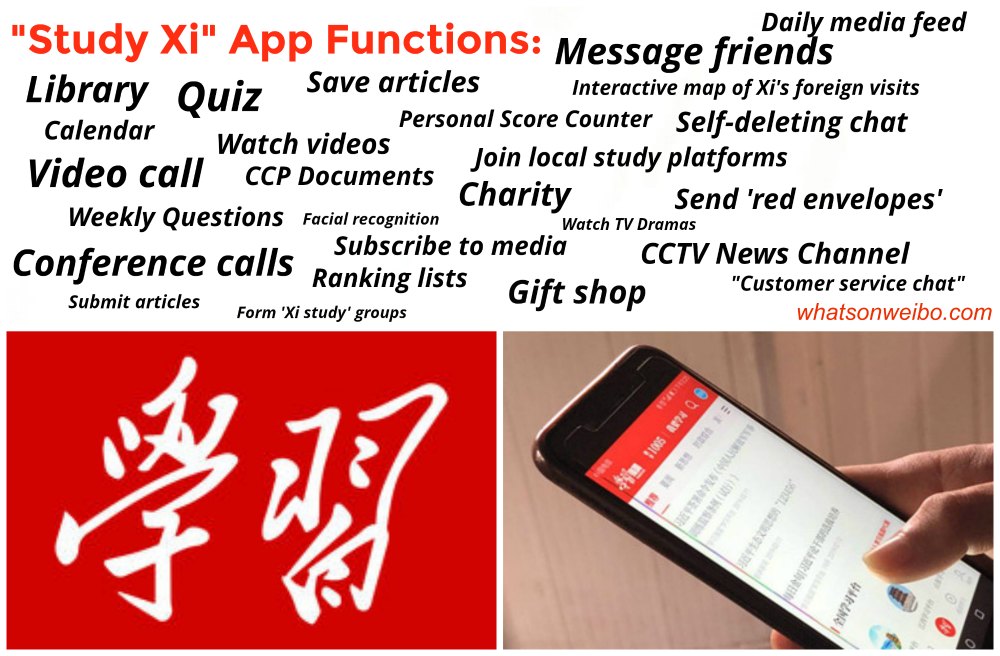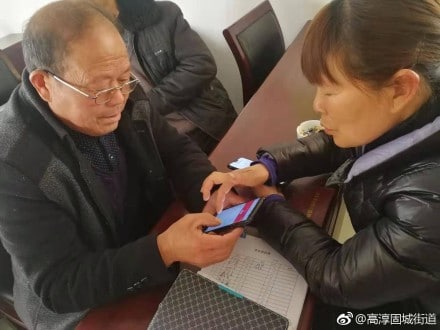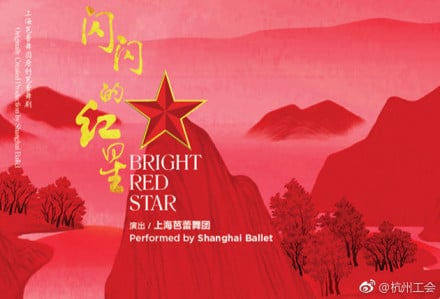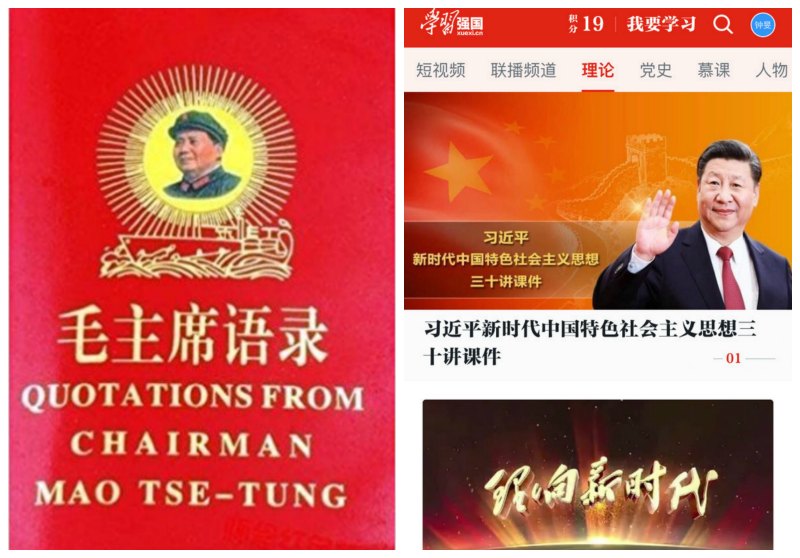First published
Since its launch in January of this year, the ‘Study Xi, Strengthen China’ app (Xué Xí Qiáng Guó 学习强国, also ‘Study Xi, Strong Country’)1, that was released by the CCP Central Propaganda Research Center (中央宣传部宣传舆情研究中心), has been making headlines both in and outside of China.
The app, that revolves around studying “Xi Jinping’s Thought on Socialism with Chinese Characteristics for a New Era” (习近平新时代中国特色社会主义思想), is still top ranking on China’s popular app charts: it is the overall second top free app in the Chinese iOS Store, and the number one most popular educational app in Chinese charts at the time of writing.
‘Study Xi’ is a multi-functional educational platform that offers users various ways to study Xi Jinping Thought, Party history, Chinese culture, history, and much more. Once people are registered on the app, they can also access the platform via PC. Every user has a score that will go up depending on how active they are on the app.
An important part of the app is its news feed: the home page features “recommended” reads that all focus on Xi Jinping and the Party. Another major feature is its ‘quiz’ page: every week, there are different quizzes that users can do, relating to all sorts of things, from Party ideology to famous Chinese poems.
For our previous article on the app, we listed some of its functions in the image below. It is much more than a media app alone; it also has a social function, that allows users to connect with friends, message them, call them, and even send them ‘red envelopes’ (money presents).

As its popularity continues, and Weibo discussions on the app continue, we will answer some of the questions you might have about the app in this article.
#1 Was the app developed by Alibaba?
Ever since its launch, it has been rumored that Alibaba is the company that developed this app. In the app’s descriptions, however, all copyright and credits go to the Central Propaganda Department of the Communist Party that has allegedly started developing this app since November of 2017. Nowhere does it say that Alibaba was involved in its development.
Alibaba’s involvement, however, is in no way a secret: the app’s ‘red envelope’ function is made possible through Alipay, the online payment platform that is owned by Ant Financial Services Group, an affiliate company of the Chinese Alibaba Group. One way for users to verify their identity on the app is also by linking it to their Alipay account.
Users of the app also noted that, upon registering for the app, their old Ding Ding conversations were automatically loaded into their chat history. Others said that upon changing their Ding Ding password, their Study Xi password was automatically also changed. Ding Ding is a multifunctional enterprise messaging app by Alibaba (read here), and many of its functions are also incorporated in the Study Xi app.
“I just discovered Study Xi is based on the Ding Ding app – all conversations I had with a good friend on Ding Ding are also displayed on the Study Xi app,” one of the many Weibo comments on the topic said: “Have other people found out yet that the user information between Study Xi and Ding Ding are interoperating with each other?”
According to a Reuters article from February of this year, sources confirmed that the ‘Study Xi, Strengthen China’ app was indeed developed by a special projects team at Alibaba known as the ‘Y Projects Business Unit’ (Y项目事业部). In 2018, Alibaba also published job positions on its website for this ‘Y Projects Business Unit,’ in which the offered jobs would entail working on an “educational platform.”
#2 Is ‘Study Xi’ mandatory?
Various English-language media covering the Study Xi app have called it a “mandatory app,” but it is not true that all Chinese mobile phone users are required to download it.

Local training for the Study Xi app, image by @高淳固城街道 (March 14, 2019).
Party members, however, are strongly encouraged to use the app to learn more about Party ideology, new policies, and political theory.
All over the country, there are local Party meetings where Party members are taught how to download and use the app. Local state media Weibo accounts frequently post about these meetings, with some mentioning that they are organized as ordered by “higher authorities” (“按照上级有关要求” or “按照要求”), suggesting that organizing and/or attending these classes and downloading the app is indeed mandatory for Party members.

A ‘Study Xi’ meeting in Debao county in Baise, Guangxi. Image via Xinhua.
Many Chinese (state-owned) companies and schools have also ordered their employees and students to download the app. Some Weibo users write that their school requires them to score a certain number of points per day on the app.
“A lot of people I know now use the ‘Study Xi, Strengthen China’ app, but it’s not the same everywhere, as it is required to score a certain number of points in some places. This work method will even make people dislike good things. Studying should be conscious and voluntary,” one Weibo blogger wrote in March.
“I used to like the app because there’s news on current politics and there are quizzes, but since my work unit requested us to spend 30 minutes per day on it, I started to find it annoying,” one netizen (@超凶的钢丝球) said.
“The leader of my mum’s factory had all the workers download the ‘Study Xi, Strengthen China’ app – this world has gone crazy,” another commenter wrote.
“How can they force us to score 30 points per day?” one Weibo commenter wrote: “I’m happy they canceled the rankings. This should not be mandatory.”
The ‘ranking system’ this netizen refers to, was a function in the app that allowed users to view the scores of other users and friends. In late March, nearly three months after the app was launched, its ranking feature was canceled. This means that users can no longer view other people’s score and ‘compete’ with them. The maximum score per day was also reduced from 66 points to 52 points.
Many people on Weibo expressed that they were happy that the ranking system was canceled since they allegedly suffered from peer pressure to reach a certain score. But there are also those who say they found the ranking system “motivational,” and write they are disappointed their scores are now private. “We can always still share our scores on social media,” one Weibo user suggested.
#3 How does the scoring system work?
The scoring system of the ‘Study Xi’ app works as follows:
- Upon registering for the app, you receive 1 point.
- For every article or essay one reads, you get 1 point (one per article, does not work with articles that have already been viewed before, maximum 6 points per day).
- For every video you watch you get 1 point (the same video won’t be credited with an extra point if you see it twice, max 6 points per day).
- The time you spend on the app is also rewarded with points: for every 2 minutes of reading an essay, you get 1 point (max 6 points per day).
- For every 5 minutes of watching a video, you get 1 point (max 8 points per day).
- You get 1 point for “subscribing” to a media account, which will then show up in your news feed.
- If you share two articles with friends, you get 1 point.
- You get 1 point for every two articles or essays you ‘save’ within the app.
- If you score 100% on a quiz, you get 10 points.
The app encourages users to ‘Study Xi’ at particular times of the day. The morning 6:00-8:30 timeframe, along with the 12:00-14:00 slot and evening 20:00-22:30 times, are designated as so-called “active time slots” during which users can score double points for their activities. Within these time slots, reading an article would, for example, grant a user 2 points instead of 1.
This signals that, in line with good working morale, people are supposed to look into the app during their morning commute, their lunch break, and before bedtime, and are indirectly discouraged from using it during (office) working hours.
The points that are scored on the app will be valid for two years.
Those who accumulate enough points can exchange them for gifts, such as study books or dictionaries, cinema tickets, or other items, which will then be sent to their home address.
Recently, more places also offer special discounts for people with a high Study Xi score. In those regards, the score system is somewhat similar to Alibaba’s Sesame Credit score, that also allows people with high scores certain benefits.
This month, various scenic spots across China’s Henan province offer people with a score of 1000 or higher free entrance to their sites. Those with 1000 points, for example, get one free entrance ticket to the Zhengzhou Fuxi Mountain scenic spot; those who have 2500 points get five tickets for free.

Another recent example is that ‘Study Xi’ users can now get a discount on tickets for the ballet show Bright Red Star.
#4 Is the app the Little Red Book ‘2.0’?
Foreign media have described the ‘Study Xi’ app as a “high-tech equivalent of Mao’s Little Red Book,” but to what extent is it really?

There is, of course, no straightforward answer here. The Little Red Book and the ‘Study Xi’ app are very different in many ways. The Quotations from Chairman Mao Zedong book was first published in 1964 and fully focused on selected quotations by the Chairman of the Chinese Communist Party. More than a book, it became a symbol of the Cultural Revolution and was a talisman for many (also see Mao’s Little Red Book: A Global History).
The ‘Study Xi’ app is not a singular text and goes much further than Xi alone; it has an online database containing texts and videos from dozens of sources and is a platform that allows users to educate themselves on various topics, from architecture to biology and much more.
But one thing to keep in mind is that both the Little Red Book and the ‘Study Xi’ app are propaganda methods that communicate a strong message through a medium that can be easily placed in many locations, reaching a great number of people. They both revolve around their Communist leaders, turning them into political idols, and literally brings Party ideology within a hand’s reach.
By turning the ‘Study Xi’ platform into an app that people can also show at various places to get free tickets, based on their score, they are also turning the app into something that matters in the public domain.
#5 How is the app received by Chinese internet users?
Online responses to the app have been somewhat mixed ever since it came out. For the past months, we’ve been consistently checking online responses to the app. “It’s the app that Party members dread, and non-Party members love” is a comment that popped up on Weibo recently, and it seems to cover a general sentiment: many people appreciate the app, but when it is required of them to use it an to score a certain number of points, they start to dread it.
One popular history blogger (@豢龙有道) recently praised the app on Weibo, saying they had previously not thought of downloading it because they are not a Party member, but now discovered the rich educational sources the app offers. That post was shared over 45,000 times.
The hashtag “‘Study Xi, Strengthen China’ is a treasure app” (#学习强国是个宝藏app#) has been viewed over 180 million times on Weibo, with thousands of commenters applauding the app; they mostly seem to praise its many online educational sources, which include MOOC (Massive Open Online Courses) on dozens of subjects, and its online ad-free library of movies, TV dramas, and documentaries.
One general sentiment that most people seem to agree on is that the app is “not bad at all” in how it has been developed and the sources it offers.
In this day and age, Chinese internet users can choose from thousands of different media apps, TV channels, newspapers, and magazines. For the Central Propaganda Department to develop a product that is now being used by millions of people across the country who think it is “not bad at all,” is perhaps really not bad at all.
Also read:
* Gamifying Propaganda: Everything You Need to Know about China’s ‘Study Xi’ App
* Here’s Xi the Cartoon – Online Animations Are China’s New ‘Propaganda Posters’
* Top 5 Most Popular Study and Educational Apps in China
By Manya Koetse
Follow @whatsonweibo
1Translation suggested by Helen Wang @helanwanglondon.

Directly support Manya Koetse. By supporting this author you make future articles possible and help the maintenance and independence of this site. Donate directly through Paypal here. Also check out the What’s on Weibo donations page for donations through creditcard & WeChat and for more information.
Spotted a mistake or want to add something? Please let us know in comments below or email us.
©2019 Whatsonweibo. All rights reserved. Do not reproduce our content without permission – you can contact us at info@whatsonweibo.com.
The post Explainer: Answering Five Big Questions on the ‘Study Xi’ App appeared first on What's on Weibo.